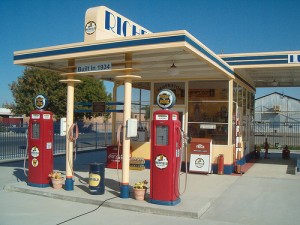Understanding the Railroad Cliché

Tax collector.
It’s become a cliché that the problem with railroad companies is that they defined themselves as railroad companies. When other forms of transportation came along, railroad executives missed the opportunity to become multi-modal transportation companies. They boxed themselves out of the next growth industry.
I’ve often heard executives mention railroads as a cautionary tale: don’t define your business too narrowly. Indeed, the idea has become a meme that seems to live independently of us. Like a virus, it simply replicates and spreads.
I didn’t know where this particular meme came from, so I decided to track it down. By tracing where the insight came from and how it developed, I thought I could learn more about how to avoid disruption.
I found the originating article fairly quickly: “Marketing Myopia” by Theodore Levitt published in Harvard Business Review in 1960. I’m sure I’ve read the article before but I don’t remember when. The meme simply planted itself in my head and lived on without further cultivation.
What else did Levitt have to say? Essentially that businesses exist to solve problems for their customers. Too many businesses become enamored of their technology and their production processes and put the customer at the end of the chain rather than at the beginning.
Levitt uses the petroleum industry as a running example of the problem. As he saw it, oil companies define themselves as oil companies, not as energy companies. They focus on finding, extracting, and refining oil and don’t really understand their customers’ issues.
Levitt points out that people don’t like buying gasoline. It’s an interruption and an inconvenience and how can you really tell if you’re getting good gas or not? He writes, “What [people] buy is the right to continue driving their cars. The gas station is like a tax collector….” Levitt predicted that a new technology – probably fuel cells – would soon make it easier to continue driving our cars and that oil companies would be in dire straits.
Levitt also warned that technical research would not protect companies from obsolescence. Technical research tends to focus on improving something that already exists. The issue is that something that doesn’t exist comes along to disrupt existing industries. Fall in love with your technology and you’ll be blinded to the threat.
Similarly, mass production is like a drug. Too many executives believe that they can solve most any problem by scaling up and reducing unit costs. But that simply lowers the cost of something that customers don’t want.
As Levitt writes, it’s ultimately about the customer, “Selling focuses on the needs of the seller, marketing on the needs of the buyer.” Rather than focusing on technology, products, and production, a marketing-oriented company focuses on “satisfying the needs of the customer by means of the product and the whole cluster of things associated with creating, delivering, and, finally, consuming it.”
Ultimately, marketing is not about making the product attractive to the customers. It’s about making products that attract customers. When we use the railroad cliché, we sometimes forget that. We may think about definitions and imagination. But it’s really about understanding and it begins with the customer.